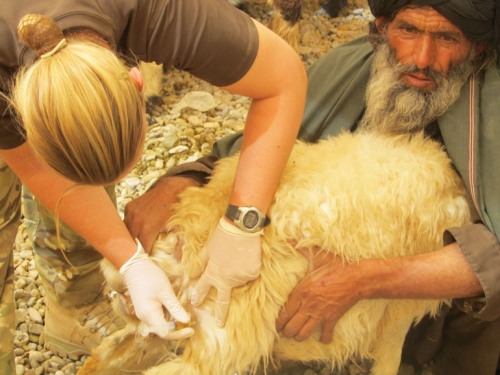The Official British Army Blog
Soldiers and Officers of the British Army in their own words
Bemused chickens, lazy goats and a dizzy sheep
4 November 2010 by britisharmy
In her latest blog, Captain Joanna Lowe of the Royal Army Veterinary Corps writes about a busy veterinary engagement clinic and the events immediately following it.
The most recent veterinary engagement clinic was run from Check Point (CP) Yellow 14 in the Combined Force Lashkar Gah Area of Operations. Having seen approximately 700 livestock in the morning – including two very bemused chickens, a herd of goats that had been brought in because they were ‘lazy’ and a sheep that was reported to be ‘dizzy’ – we settled down for a well deserved cup of tea.
A while later, I was approached by a member of the Afghan National Police (ANP) from the front gate as a farmer from that morning had returned to the CP with a dead sheep, reporting that I had killed it with medicine. He had come seeking compensation for his loss from the Military Stabilisation and Support Team (MSST) representative (worth up to $150 for a sheep). However, on examining the sheep’s carcass, which had been carried in on the back of a very patient donkey, the diagnosis was clear. Rather than suffering a fatal reaction (of which there was no evidence on the body) to the extremely safe worming product that had been administered, the more probable cause of death was loss of blood as a result of a deep incision to the throat. After suggesting this alternative hypothesis to the farmer he thought carefully for a moment before countering that he had killed it pre-emptively as he could tell that the medicine was going to kill it. By this time the interpreter, the crowd of ANP who had come over to investigate the commotion and the farmer’s friend who had accompanied him into the CP were laughing openly as the story about the sheep’s sorry demise was looking more and more far-fetched. In a last ditch attempt to salvage something from the situation the farmer asked once more whether he could have compensation, although the sheepish look on his face said he already knew the answer…
Compensation is awarded to farmers who have lost livestock as a direct result of ISAF action – for example if they are caught in an artillery strike or involved in a road collision. This incident illustrates that the farmers are aware of the scheme, but also highlights the negative effects that inappropriately awarded compensation could have. Had this farmer successfully gained the lucrative payout, I have no doubt that a dozen more sheep would have met their maker prematurely that day!...
From an official British Army blog here. And for background on the MoD entry into blogging the war:
Blogs of war - stories from the front line
A People In Defence news article
3 Nov 10
War reporting has changed. These days, we can learn about life and death on the front line from blogs. Lorraine McBride explores the phenomenon.

A Royal Marine hurls a smoke grenade, giving protection to a counter-IED team
[Picture: Crown Copyright/MOD]
Blogging is a communications phenomenon and there are an estimated 200 million people out there in cyberspace who regularly record their thoughts and observations online for others to read and comment on.
Among them is an ever-growing army of military men and women keen to write about their world, sharing their views on everything from Army food, to the fears and satisfaction of serving in a war zone.
It was the appetite of British soldiers, sailors, marines and airmen to share their operational experiences with the rest of the world which prompted the establishment of officially approved bloggers during Operation HERRICK 11 in Autumn 2009.
There were already some unofficial blogs being published by troops in Afghanistan, and there was the UK Forces Afghanistan blog, run by the Joint Media Operations Centre in Helmand. But there was no central site where people could access a range of regular military blogs and build up a picture of life in a war zone.
In July this year, British troops in Afghanistan launched their first mass blogging initiative, with scores of men and women posting from the front line on Army, Navy and RAF websites....
[...]
But just who is hanging on their every word?
"Those who read blogs cover all age groups, across every social background and nationality," said Pippa. "It has such wide appeal, but then we have one of the most compelling stories of the decade."
One of the biggest challenges of blogging from Afghanistan has been the shortage of time. Working weeks of 18-hour days in extremely harsh conditions mean there may be few opportunities to post.
The UK's military men and women who share their views with the world give the closest possible insight into what the coalition and the Afghans themselves are trying to achieve in Afghanistan, and what this means for many thousands of dedicated troops....
More here.
















No comments:
Post a Comment